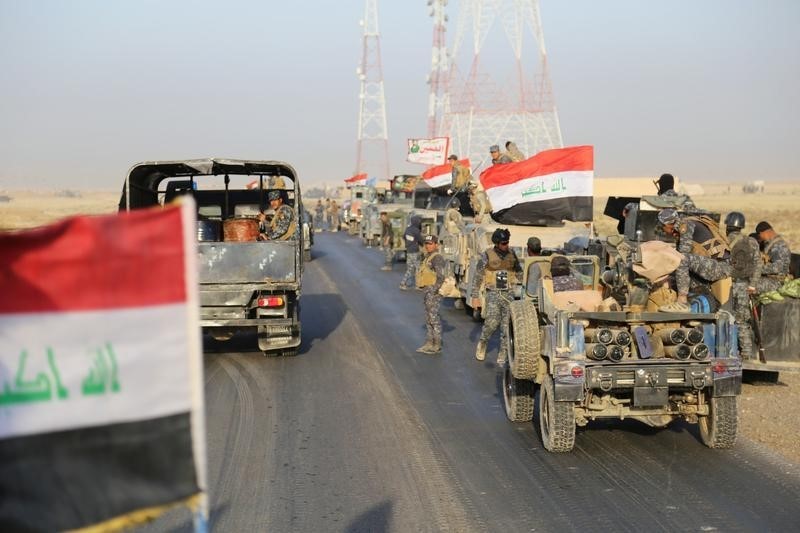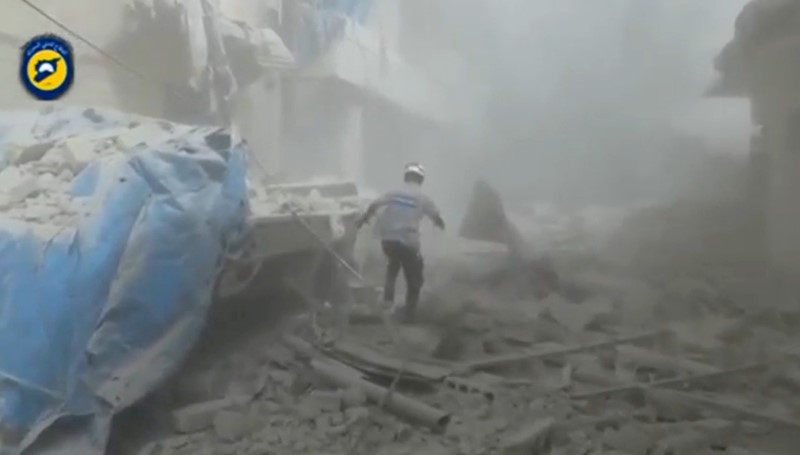
By Lisa Barrington
BEIRUT (Reuters) – A Syrian rescue service operating in rebel-held territory said on Tuesday a helicopter dropped containers of toxic gas overnight on a town close to where a Russian military helicopter had been shot down hours earlier.
The opposition Syrian National Coalition (SNC) accused President Bashar al-Assad of being behind the attack. Assad has denied previous accusations of using chemical weapons.
A spokesman for the Syria Civil Defence said 33 people, mostly women and children, were affected by the gas, which they suspect was chlorine, in Saraqeb, in rebel-held Idlib province.
The group, which describes itself as a neutral band of search and rescue volunteers, posted a video on YouTube apparently showing a number of men struggling to breathe and being given oxygen masks by people in civil defense uniforms.
“Medium-sized barrels fell containing toxic gases. The Syrian Civil Defence was not able to determine the type of the gas,” said the spokesman.
The Syrian government and its Russian allies were not immediately available for comment.
Later, state news agency SANA said rebels had fired rockets armed with toxic gas on the government-held old quarter of Aleppo city, killing five people and causing eight breathing difficulties. It gave no further details. Rebels have denied previous accusations of using chemical weapons.
The SNC said of the reported use of poison gas in Saraqeb: “After shelling, besieging and killing civilians and perpetrating war crimes on them, the Assad regime has resorted once again, and in breach of UN resolutions 2118 and 2235, to using chemical substances and toxic gases.
“The daily reality confirms that all the international agreements and previous security council decisions, be they about chemical weapons or otherwise, are meaningless for the Assad regime.”
The Civil Defence spokesman said it was the second time Saraqeb had been hit by toxic gas. The group was aware of around nine suspected chlorine gas incidents across Idlib province since the conflict began, he said.
The U.S. State Department said it was looking into the reported use of chemical weapons in Saraqeb.
“I’m not in a position to confirm the veracity of (the reports),” said spokesman John Kirby. “Certainly, if it’s true, it would be extremely serious.”
Monitors at the Britain-based Syrian Observatory for Human Rights, which tracks violence on all sides in the civil war, said barrel bombs fell on Saraqeb late on Monday, wounding a large number of citizens.
Russia’s defense ministry said a Russian helicopter was shot down near Saraqeb during the day on Monday, killing all five people on board, in the biggest officially acknowledged loss of life for Russian forces since they started operations in Syria.
DENIALS
The helicopter came down roughly mid-way between Aleppo and Russia’s main air base at Hmeimim in the western province of Latakia, near the Mediterranean coast.
Russian air power began supporting Syrian President Bashar al Assad late last year, an intervention which tipped the balance of the war in Assad’s favor, eroding gains the rebels had made that year.
No group has claimed responsibility for downing the Mi-8 military transport helicopter.
Government and opposition forces have both denied using chemical weapons during the five-year-old civil war. Western powers say the government has been responsible for chlorine and other chemical attacks. The government and Russia have accused rebels of using poison gas.
U.N. investigators established that sarin gas was used in Eastern Ghouta in 2013. The United States accused Damascus of that attack, which it estimates killed 1,429 people, including at least 426 children. Damascus denied responsibility, and blamed rebels.
Later that year the United Nations and the Syrian government agreed to destroy the state’s declared stockpile of chemical weapons, a process completed in January 2016.
The Organisation for the Prohibition of Chemical Weapons confirmed in late 2015 that sulfur mustard, commonly known as mustard gas, had been used for the first time in the conflict, without saying which party in the many sided conflict it thought had used it.
(Additional reporting by Lesley Wroughton in Washington; Editing by Samia Nakhoul and Robin Pomeroy)










